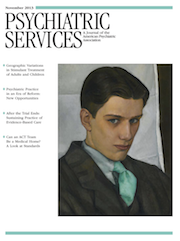Use of Antidepressant Medication in the United States During Pregnancy, 2002–2010
Abstract
Objective
The authors analyzed prescribing for antidepressant medications during 27,328 prenatal visits in ambulatory settings in the United States between 2002 and 2010.
Methods
Data from the 2002–2010 National Ambulatory Medical Care Survey and National Hospital Ambulatory Medical Care Survey were used to compare prescribing for antidepressant medication during visits for outpatient prenatal care between 2002–2006 and 2007–2010.
Results
Prenatal visits associated with a prescription for an antidepressant increased from .7% in 2002–2006 to 2.1% in 2007–2010 (p<.01). The proportion of prescriptions for selective serotonin reuptake inhibitors (SSRIs) declined (from 87% to 66%, p=.04), particularly for paroxetine (from 19% to <1%, p<.01).
Conclusions
Despite controversy over possible negative effects, prescribing of antidepressants during pregnancy increased between 2002 and 2010. SSRIs represented a smaller proportion of all antidepressants prescribed, and prescribing of paroxetine, likely in response to warnings by the U.S. Food and Drug Administration, dropped dramatically.




